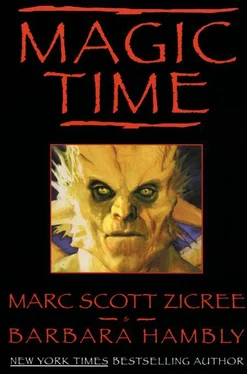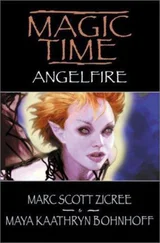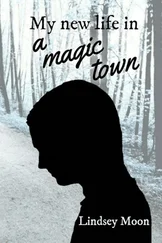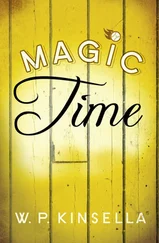Marc Zicree - Magic Time
Здесь есть возможность читать онлайн «Marc Zicree - Magic Time» весь текст электронной книги совершенно бесплатно (целиком полную версию без сокращений). В некоторых случаях можно слушать аудио, скачать через торрент в формате fb2 и присутствует краткое содержание. Жанр: Фэнтези, на английском языке. Описание произведения, (предисловие) а так же отзывы посетителей доступны на портале библиотеки ЛибКат.
- Название:Magic Time
- Автор:
- Жанр:
- Год:неизвестен
- ISBN:нет данных
- Рейтинг книги:3 / 5. Голосов: 1
-
Избранное:Добавить в избранное
- Отзывы:
-
Ваша оценка:
- 60
- 1
- 2
- 3
- 4
- 5
Magic Time: краткое содержание, описание и аннотация
Предлагаем к чтению аннотацию, описание, краткое содержание или предисловие (зависит от того, что написал сам автор книги «Magic Time»). Если вы не нашли необходимую информацию о книге — напишите в комментариях, мы постараемся отыскать её.
Magic Time — читать онлайн бесплатно полную книгу (весь текст) целиком
Ниже представлен текст книги, разбитый по страницам. Система сохранения места последней прочитанной страницы, позволяет с удобством читать онлайн бесплатно книгу «Magic Time», без необходимости каждый раз заново искать на чём Вы остановились. Поставьте закладку, и сможете в любой момент перейти на страницу, на которой закончили чтение.
Интервал:
Закладка:
Since the collision that had broken her son’s neck, Arleta, who had never dealt particularly well with the world, had barely been out of the house. Even as a child, Wilma had been aware that Mrs. Wishart Next Door didn’t like to be outside. Playing in the yard, she’d see the small, sloppily stout young woman in her white uniform hurrying to the bus stop to go to her job, then hurrying home again in the evenings as if she didn’t dare pause. As if there were snipers in the trees, ready to shoot her if she didn’t get to a safe place quickly.
Later, as a teenager, Wilma made it a point to drop by in the afternoons, or ask her to go shopping or to a movie on those frequent Saturdays when the twins would be at Little League and her husband, Dr. Wishart Sr., was working at the hospital. Like the boys-who were seven years her junior-Wilma had come to accept that this was the way Mrs. Wishart was. Her husband always answered the telephone or the door, always took her shopping. When she wasn’t with him, she looked confused.
The summer Wilma graduated from high school, a movie house opened in Beckly that had deliciously icy air-conditioning and fifty-cent matinees. She and Mrs. Wishart-whom she was calling Arleta by that time-would spend at least one afternoon a week there and hit Farrell’s for ice cream afterward. But at three o’clock Arleta would always say, “I have to get home now.”
If asked, she’d come up with a good reason concerning the boys or her husband. But from the way she said it, Wilma understood that Arleta was afraid.
Call Arleta , she made a mental note to herself, as soon as the nurse gets there. In the hurly-burly of graduation and the closing-down of the school year, followed immediately by the family uproar surrounding her sister Siobhan’s third divorce, it had been weeks since Wilma had been able to make sure her friend got out of the house. Arleta had never been a churchgoer, and, with no brothers in the mine, she’d never made friends in the Women’s Club that went hand in hand with the union. Wilma knew there was no one else in town with whom Arleta went anywhere.
An odd family , she reflected, without judgment. The twins wrapped up in one another almost to the exclusion of anyone else, the mother wrapped up in the boys, particularly after Dr. Wishart’s death. One of the other young teachers at Allegheny High School had dated Bob for a while-past Arleta’s shoulder, through the open windows, Wilma could see the beautiful photo Bob had taken of the woman. But talking to her later, Wilma gathered that Bob’s story was pretty much the same as his mother’s. The mind always just slightly elsewhere, and at ten o’clock, I have to get home .
Nothing weird or perverted, as far as she knew-and the way the teachers and the other volunteers at the Senior Center gossiped, Wilma knew pretty much everything that went on in Boone’s Gap. No ugly secrets or bloodstained bed-linen hidden in closets. Just fear. Fear so great that it excused them, in their own eyes, from participation in the pain of real life.
Then Bob had driven down to Beckly late one night to pick up some medicine for Arleta and had come around a curve into the path of a semi heading for State Highway 64.
Call Arleta, she thought. And call Fred . And though she didn’t exactly phrase it thus to herself, it went through her mind, watching the graying, chubby woman minister to the corpselike man on the bed, that if Arleta were Fred’s sole source of information about Bob’s condition, he might not be getting the whole story. Not that Arleta would deliberately lie to the son who had deserted her twenty years ago, who had visited so seldom since. But seeing her, in her pink-and-green warmups-she had at least two dozen sets of variously colored sweat garments, which had, Wilma mused, pretty much replaced housecoats in American culture- chatting about the latest doings of the vengeful Veronica and the manipulative Christine and all the other characters of the mythical town of Springdale, it struck Wilma how terribly alone Arleta seemed.
Only her and her son. He trapped in a coma since May, she trapped by her love for him. And her fears.
Isolated, just the two of them, in that big bright machinery-cluttered room.
NEW YORK-8:14 A.M. EDT
It was early morning, and already they were out. Ruining everything.
Sam Lungo sat on his front-porch glider, in the shade of his scraggily elm, watching the world go by, or, at least, his part of it, the rectangle bordered on the west by Amsterdam, the east by Columbus, the familiar country beyond whose borders he did not venture. And why go anywhere? It was all the same, every place. He knew, he saw. Sally Jesse, Jerry, Ricki, the endless parade of vulgar people in black-and-white splendor on the old Dumont his mother had kept all those years, and which he had maintained since. Illuminated through the oil bubble in front of the screen, their grotesque faces distorted and true. Monsters, they were all monsters.
It was no different for the denizens of the block. He knew all of them, their comings and goings, their trashy little lives, their ugly, secret selves. And he knew their names, not just what they called themselves, but their real names, discovered by close appraisal over patient time. Mr. Blotches, the Varicose Lady, Yellow Teeth, Loose Ways. .
They never came through his gate, into his front yard, onto his porch. His rambling Victorian Easter egg of a house was an anomaly on this block of brownstones, a gaudy interloper, like some odd trinket dropped by a careless god from the heavens. The adults never came, anyway. Their brats stole onto his property in the dead of night, threw rotten fruit and worse at his windows, scrawled their initials on his door.
Looking out at the front yard, Sam sighed, feeling the familiar churning in his stomach. Try as he might to keep it pruned, manicured, subdued, the devil grass would keep encroaching, the weeds and thistles smothering the careful order he fought to maintain. The gate and fence were showing signs of ruination, too, growing ever more splintered and worn.
He felt, as he had so often since Mother had gone, a sense of cataclysm coming on, rushing toward him, chaotic and malevolent. There was nothing he could do to stop it. Except watch, take note, remember. Mother had said there would be an accounting. If so, she hadn’t lived to see it. And in the forty-nine years he’d been on this earth, Sam had grown ever more hopeless that justice would come.
“You there! You stop that!” Sam always tried for an authoritative tone, but more often than not it came out higher and more nasal than he intended. The Slave to the Mottled Terrier was out again, tethered to that nasty little wretch that sniffed at his rhododendron and squatted where it was least wanted.
The Slave acted like he didn’t hear. But he heard, all right. “You are breaking the law!” Sam shrilled. “I’ve seen you before!”
Reluctantly, the Slave tugged the protesting dog away. Glaring, Sam pulled the notepad from his shirt pocket, jotted in his cramped chicken scratches the specifics of event and time and day. It was all there, the microscopic history of this place, all the petty crimes they would want forgotten. But that would not happen.
He was the witness.
It was one of those glorious summer mornings, in which the splash of sunlight against the buildings and the lulling breezes made New York seem both exquisite and livable. But to Cal Griffin, it spoke only irony. His mind was a battlefield, and he felt the previous night’s dream like a black truth within-the choking stench of burning and blood, the screams that tore at him, his stillness, his failure of nerve.
Spurred by these, Cal had embraced an action he knew to be undeniably, shamefully right and set Schenk free.
Читать дальшеИнтервал:
Закладка:
Похожие книги на «Magic Time»
Представляем Вашему вниманию похожие книги на «Magic Time» списком для выбора. Мы отобрали схожую по названию и смыслу литературу в надежде предоставить читателям больше вариантов отыскать новые, интересные, ещё непрочитанные произведения.
Обсуждение, отзывы о книге «Magic Time» и просто собственные мнения читателей. Оставьте ваши комментарии, напишите, что Вы думаете о произведении, его смысле или главных героях. Укажите что конкретно понравилось, а что нет, и почему Вы так считаете.












